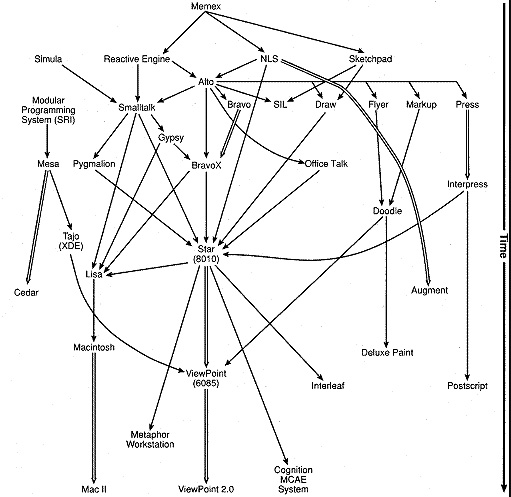 Bushy Tree Diagram
Bushy Tree Diagram Bushy Tree Diagram
Bushy Tree DiagramAn interesting and (apparently) fairly well known diagram from the 1989 paper "The Xerox Star: A Retrospective", showing the family relationships of a number of information systems from VannevarBush's MemexVision to the Macintosh II among many others.

(The highlighted arrows represent direct successors.)
The whole paper is at http://www.cs.umd.edu/class/fall2003/cmsc434-0201/Handouts/XeroxStar.pdf (PDF) and http://www.digibarn.com/friends/curbow/star/retrospect/index.html (HTML).
JohnRedant?, BruceDamer? and others later produced a revised version, bringing its coverage up to the year 2000 among other things:

In the source page, http://www.digibarn.com/stories/desktop-history/bushytree.html, the tree has an imagemap with links to many of the projects shown.
The diagram is quite XeroxParc-centric, but there's probably good reason for that, over and above the original paper's XeroxStar? focus...
You could probably find fault with quite a few details in the diagram(s) - no SelfLanguage or LogoLanguage? no link from SketchPad to SmalltalkLanguage? - but it seems valuable both as a general overview and as a source of pointers to many now-obscure systems. It's interesting to see how the graph links together modern-day systems as diverse as MacOsx, HyperTextMarkupLanguage, JavaLanguage/JavaPlatform and PhotoShop.
Also, IIRC, the Cedar project (where Modula-2 was born) eventually begat the Oberon System project too, which also draws from Simula too. --SamuelFalvo?
In 2008 the Bushy Tree begot a new WikiaWiki?, the BushyTreeWiki? : http://bushytree.wikia.com/wiki/IEEE_Bushy_Tree
See also HyperTextHistory
 EditText of this page
(last edited August 25, 2014)
or FindPage with title or text search
EditText of this page
(last edited August 25, 2014)
or FindPage with title or text search